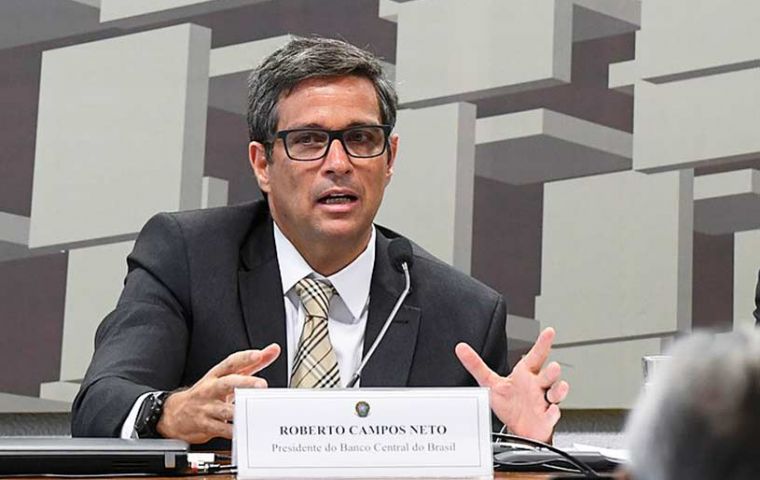MercoPress. South Atlantic News Agency
Double digit inflation in Brazil spiked by increasing fuel and food costs
 Policy maker Central Bank chair, Roberto Campos Neto is expected to raise the Selic to 8.75% by the end of next year, above the previous estimate of 8.5%
Policy maker Central Bank chair, Roberto Campos Neto is expected to raise the Selic to 8.75% by the end of next year, above the previous estimate of 8.5% Brazilian market analysts raised their forecasts for inflation and the Selic key interest rate for 2022 as increasing fuel and food costs plus resurgent demand for services are spiking prices as the pandemic seems to be coming to an end.
Policy makers led by Central Bank chair, Roberto Campos Neto will raise the Selic to 8.75% by the end of next year, above the previous estimate of 8.5%, according to the survey published every Monday. The survey indicated that market analysts expect inflation to end 2022 at 4.14%, up from the previous forecast of 4.02%.
Brazil’s consumer prices rose 10,25% in September from a year ago, breaking double digits for the first since 2016. While Campos Neto has said inflation probably peaked last month, he added that an increase in domestic fuel prices announced by Petrobras on Friday would likely add to inflation expectations.
The central bank has lifted borrowing costs by 425 basis points since March, and signaled another full-percentage point hike is on tap later this month. Campos Neto said inflation probably peaked in September, and economists expect it will finish 2021 at 8.51%.
The fact is that Brazilians have rarely seen the current double digit inflation in a quarter century, the last time was in 2016, which helped remove ex president Dilma Rousseff from the Planalto Palace following a vote in Congress.
While in double-digit inflation territory, in the twelve months through September, electricity prices jumped 28.8%, cooking gas 34.7%, and chicken surged 28.8% and red meat 24.8%. But the high inflation is not limited to Brazil, US inflation was running at 5,4% in August, the fastest since 2008, and the UN FAO food prices index was at a ten year high in September.
But that is not the only issue in Brazil, the worst drought in nine decades has emptied most hydroelectric reservoirs forcing to appeal to expensive thermoelectric power plus a “water scarcity” rate. Add a depreciated Real currency and indexed price increases, and the government is facing growing discontent.
In effect president Jair Bolsonaro's approval rating is at its lowest, with street demonstrations complaining about vaccines and double digit inflation. In a live broadcast on Facebook, the president dedicated substantial time to inflation, displaying pictures of foodstuffs and comparing Brazil’s prices versus the U.S.
“This crisis is all over the world, not just Brazil. Some think I should do more to contain inflation. Do what else? Give me an example,” he said. “And in some countries it’s not just inflation, but shortages. When will we return to normal? I don’t know, it will take time.”
Last but not least unemployment remains high and the government’s pandemic welfare program that had been a lifeline to about one third of the population has been reduced and will expire this month. The Bolsonaro administration is believed to be working on a possible Emergency subsidy in anticipation of October 2022 election, when the president is expected to bid for reelection.




Top Comments
Disclaimer & comment rulesCommenting for this story is now closed.
If you have a Facebook account, become a fan and comment on our Facebook Page!